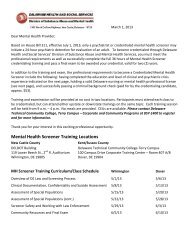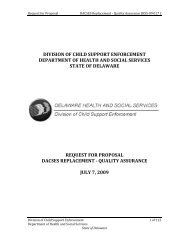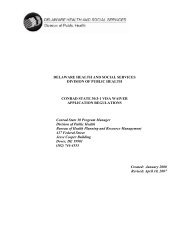D18233 GACHA Annual Report.qxd - Delaware Health and Social ...
D18233 GACHA Annual Report.qxd - Delaware Health and Social ...
D18233 GACHA Annual Report.qxd - Delaware Health and Social ...
You also want an ePaper? Increase the reach of your titles
YUMPU automatically turns print PDFs into web optimized ePapers that Google loves.
Objectives–Year 3: 2010<br />
<strong>GACHA</strong> 2007 <strong>Annual</strong> <strong>Report</strong><br />
• Youth Council identified in at least one district per county that is representative of the ELL population<br />
• Zero tolerance policy on student-to-student hate crimes is adopted (2007 School Bullying Prevention Act passed as described<br />
above compare data for implications of incidences by all of the subgroups of NCLB)<br />
• Increase in the number of alternative programs to increase graduation rates among Hispanic students<br />
• Increased enrollment of Hispanic students in institutions of higher education<br />
• Decreased Hispanic student achievement gap<br />
• Increased Hispanic student graduation rates<br />
Objectives–Year 5: 2012<br />
• Increase in Hispanic graduation rates<br />
• Increase in Hispanic student enrollment in higher education<br />
• Increase in number of Hispanic students involved in the <strong>Delaware</strong> SEED scholarship program<br />
• Decrease in Hispanic student achievement gap<br />
The baseline year for these objectives is 2007. Targets through 2012 have not been determined. Data needs to be collected <strong>and</strong> reviewed<br />
in the areas of graduation rates, HSRP involvement, <strong>Delaware</strong> SEED participation, achievement gap, enrollment in institutions of higher<br />
education <strong>and</strong> bullying incidents to properly determine targets for each area.<br />
Recommendations from the 2006 <strong>GACHA</strong> <strong>Annual</strong> <strong>Report</strong> continue to be a driving factor in the committee’s planning <strong>and</strong> are embodied<br />
in the stated objectives <strong>and</strong> goals above. The committee continues to focus <strong>and</strong> advocate for attention <strong>and</strong> consideration in the following<br />
areas as strategies to increase graduation rates among <strong>Delaware</strong> Hispanic students:<br />
• Teacher recruitment <strong>and</strong> retention<br />
• Innovative strategies to engage Hispanic students <strong>and</strong> families<br />
• Early childhood education <strong>and</strong> postsecondary education<br />
• Parental involvement <strong>and</strong> family literacy<br />
• Cultural competency, diversity, <strong>and</strong> celebrating differences<br />
• Safe learning environments<br />
• Increase <strong>and</strong> obtain adequate funding for ELL population <strong>and</strong> schools in areas of high poverty<br />
• Youth Leadership Councils representative of the ELL population<br />
The Education Committee is committed to collaborating with key partners to bring about change to the evidence that plagues us today—<br />
underachievement of our youth, primarily Hispanic. Although these challenges are not new, the perspective <strong>and</strong> approach to combating<br />
this societal problem is. Education is now being viewed <strong>and</strong> discussed more globally. The question now is “How can we prepare our<br />
students to compete in a global economy?”<br />
Before attempting to answer this, we must first <strong>and</strong> foremost prepare our students to succeed in their existing environment, then globalize<br />
from there. The thinking has shifted, therefore the strategies to promote <strong>and</strong> attain successful outcomes must change as well. Resources<br />
are absolutely essential to providing quality education to all students. Resources are <strong>and</strong> will continue to be an impediment <strong>and</strong> remain<br />
obscure without the support of our elected <strong>and</strong> public officials. “We can only do what we are enabled to do.” Collectively as communities,<br />
leaders, <strong>and</strong> elected officials, we have to turn the tide for our children’s sake.<br />
10
















